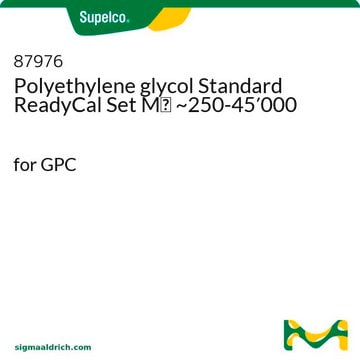81293
Poli(etilenglicol)
analytical standard, for GPC, 6,000
Sinónimos:
PEG
About This Item
Productos recomendados
grade
analytical standard
for GPC
Quality Level
shelf life
limited shelf life, expiry date on the label
mol wt
Mn ~5850
Mp ~6240
Mw ~6000
technique(s)
gel permeation chromatography (GPC): suitable
Mw/Mn
~1.03
application(s)
cleaning products
cosmetics
food and beverages
personal care
format
neat
storage temp.
2-8°C
SMILES string
C(CO)O
InChI
1S/C2H6O2/c3-1-2-4/h3-4H,1-2H2
Inchi Key
LYCAIKOWRPUZTN-UHFFFAOYSA-N
¿Está buscando productos similares? Visita Guía de comparación de productos
Application
- Quantifying thiolated chemical additives for copper electroplating process: Demonstrates the use of Poly(ethylene glycol) (PEG) in enhancing the performance of copper electroplating, a critical application in electronic manufacturing (Wang et al., 2024).
- Novel fibrous Ag(NP) decorated clay-polymer composite: Highlights PEG′s role in developing composites for water purification, addressing the urgent need for efficient removal of micro-pollutants and bacteria from water sources (Goswami et al., 2024).
- Phenylacetylene-Terminated Poly(Ethylene Glycol) as Ligands for Colloidal Noble Metal Nanoparticles: Introduces a novel PEG-based ligand system for noble metal nanoparticles, advancing applications in catalysis and materials science (Duan et al., 2024).
- Assessing the Effect of Surface Coating on the Stability, Degradation, Toxicity and Cell Endocytosis/Exocytosis of Upconverting Nanoparticles: Explores the role of PEG in modifying nanoparticles to enhance their biocompatibility and stability, crucial for drug delivery and diagnostic applications (Arellano et al., 2024).
Storage Class
10 - Combustible liquids
wgk_germany
WGK 1
flash_point_f
281.5 °F - closed cup
flash_point_c
138.6 °C - closed cup
ppe
Eyeshields, Gloves, type N95 (US)
Elija entre una de las versiones más recientes:
¿Ya tiene este producto?
Encuentre la documentación para los productos que ha comprado recientemente en la Biblioteca de documentos.
Los clientes también vieron
Nuestro equipo de científicos tiene experiencia en todas las áreas de investigación: Ciencias de la vida, Ciencia de los materiales, Síntesis química, Cromatografía, Analítica y muchas otras.
Póngase en contacto con el Servicio técnico



